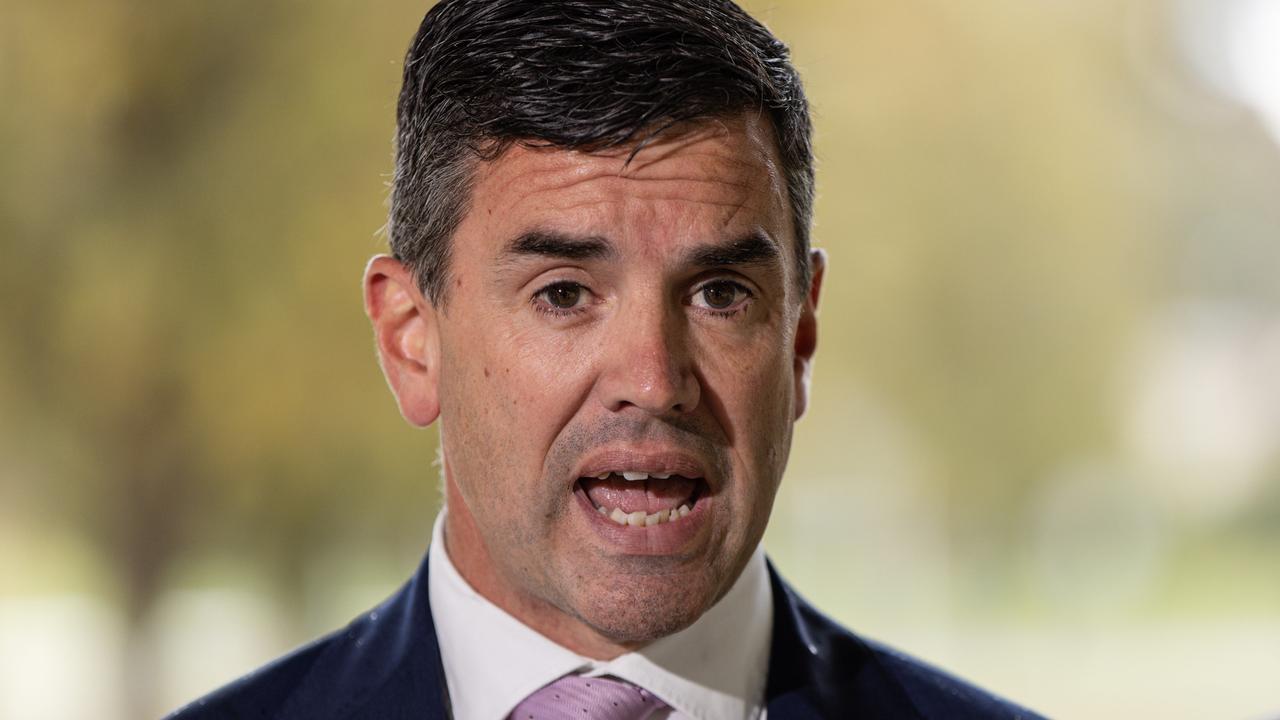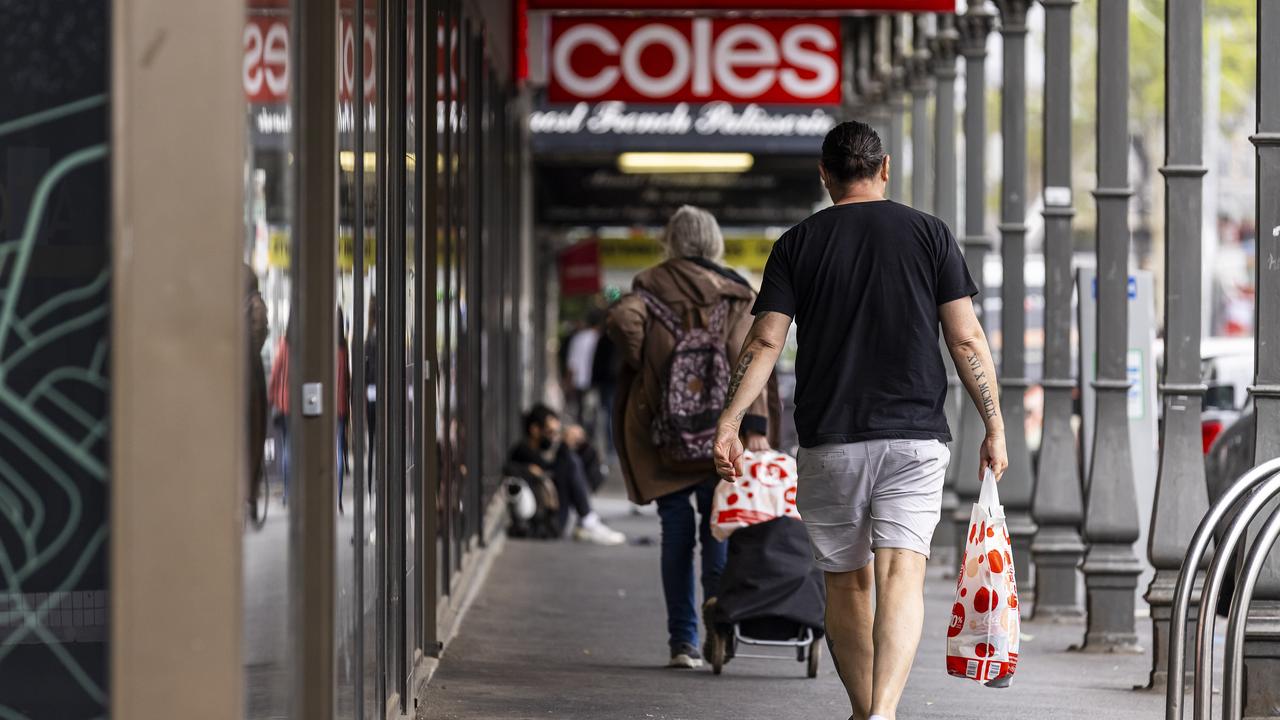Meet the producers behind Australia’s $250/kg Wagyu steak and $120/kg lamb
From milk, to steak, to chocolate, lamb and butter. We find out from the people behind some of Australia’s best tasting food what it takes to produce it.
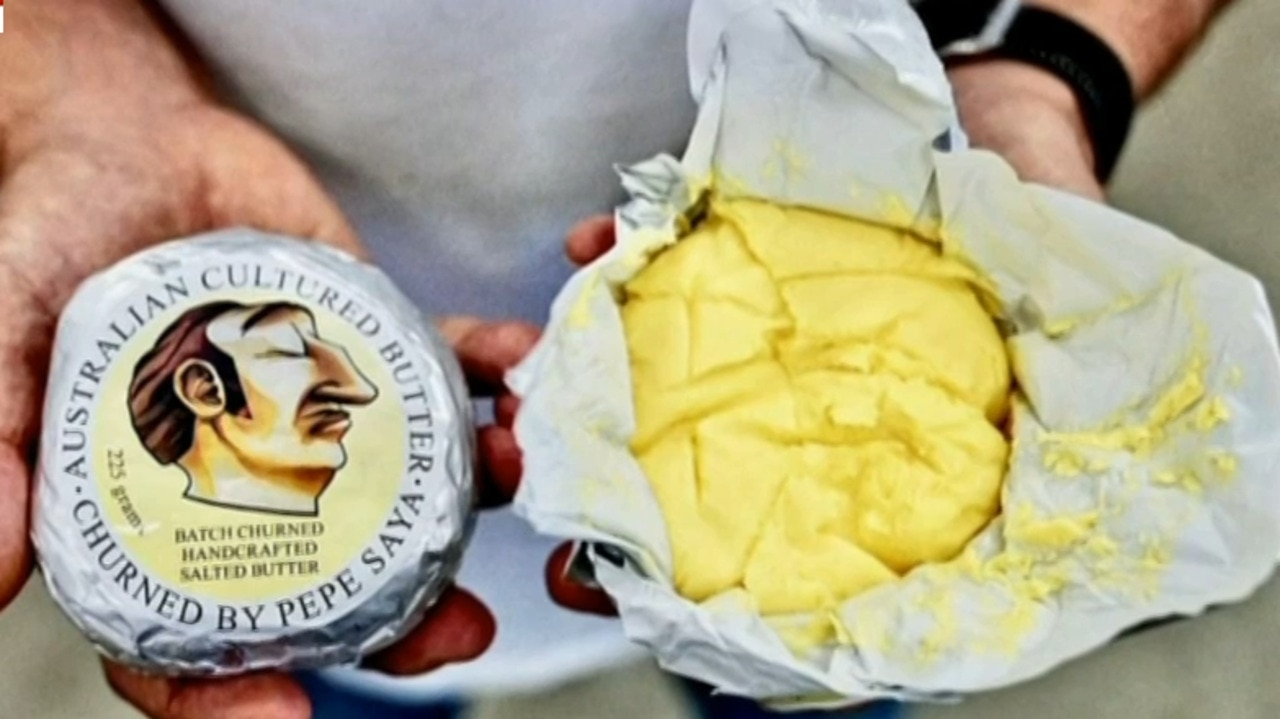
Victoria
Don't miss out on the headlines from Victoria. Followed categories will be added to My News.
Australian farmers produce some of the best-tasting food in the world.
From milk, to steak, chocolate and butter, passionate producers have worked hard to create products consumers love.
To understand what goes into producing some of our tastiest products, The Weekly Times is taking a look at the people behind some of Australia’s favourite foods.
BARAMBAH ORGANICS
Barambah Organics was founded by Queensland dairy farmers Ian and Jane Campbell.
In 1999 Ian returned to his family’s fourth-generation South Burnett dairy and started the organic conversion.
They then started processing their own organic milk in 2002.
Jane previously told The Weekly Times: “This approach is a way of life.”
“We don’t want to sound like we’re preaching and we don’t want to be critical of conventional farming, but we think organic is a better way to farm for the planet and for our family.”
While Ian and Jane still maintain significant ownership, in 2020, Tanarra Capital, an Australian investment company which sources funds from Queensland super institutions invested in Barambah Organics for an undisclosed sum. They are now the majority shareholders.
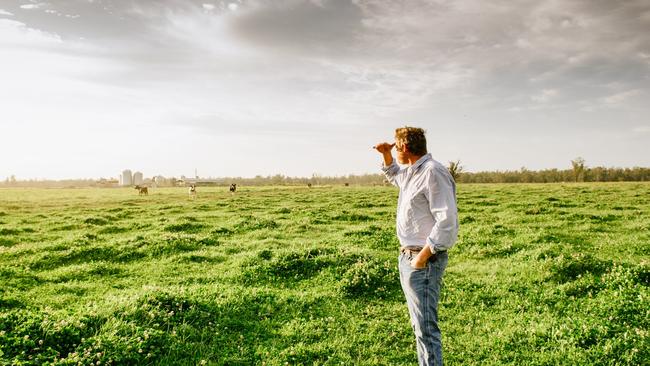
Barambah Organics products are produced across three farms from 1000 cows and the product range now includes milk, cream, cheese, yoghurt and flavoured drinks.
Now a household name, Barambah Organics chief executive Chris Elliott said he’s inspired when he hears people talk about Barambah, those that have tried it are so passionate about the taste.
“With so many multinational dairies in Australia some times we forget about the farmer and the cows,” Chris said.
“Without happy, healthy and sustainable farms and cows we cannot make the best products possible and I think consumers, especially Barambah consumers know this.”
“The Barambah you see today is really the combination of shareholder and management vision to supply great tasting, minimally processed dairy made the way it should be.”
DAVID BLACKMORE, BLACKMORE WAGYU
David Blackmore is a fifth generation farmer and was the first to import pure Wagyu cattle into Australia.
And he is now known as the godfather of Wagyu and holds the title of selling the most expensive steak in Australia.
David’s interest in Wagyu cattle was piqued in 1988 when he discovered four Wagyu that had been exported from Japan to the US for research.
This discovery began David’s lifelong passion and purpose.
David knew that Wagyu had unparalleled meat quality and therefore could increase the value of the animal. It was this understanding that led him to secure the exclusive rights to import the famed Takeda Wagyu embryos and semen into Australia.
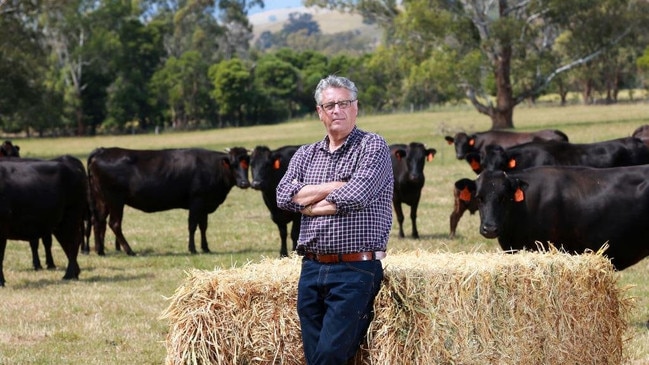
From 1992 to 2006, David imported more than 80 per cent of the Wagyu genetics into Australia and led to the creation of one of the most premium Wagyu products in the world.
Blackmore Wagyu is now sold in 14 countries and has been on the menu at Neil Perry’s Rockpool restaurants since 2006. One thing that has set David apart was engage directly with chefs.
According to an interview with the Australian Wagyu Association when he was inducted into the Wagyu Hall of Fame earlier in 2024, David said he always had a different goal to other breeders: “to produce the best quality, best tasting beef we could”.
NEIL DRUCE, JUNEE LICORICE AND CHOCOLATE
A self-confessed “dreamer” Neil Druce didn’t set out to start making licorice or chocolate.
Instead he and his family purchased an abandoned flour mill at Junee in southern NSW, originally to mill flour for their family farm, Green Grove Organics.
“And then we just got inspired by the charm of the building and kept value adding to the products we were creating and the brand built around a genuine love for what we do,” Neil said.
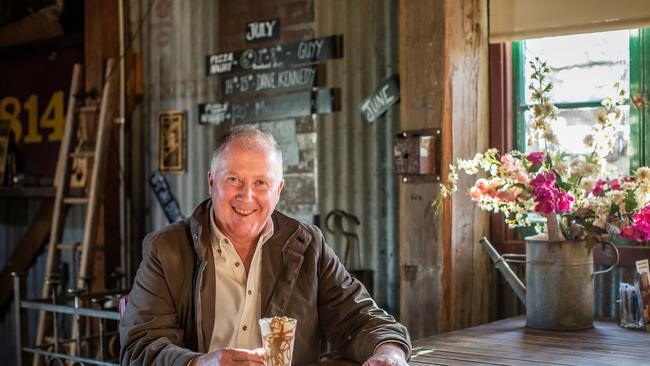
Neil purchased the flour mill in 1998 and set about renovating it. The licorice idea then came in 2001, with Neil admitting it wasn’t even his idea.
“It was suggested to me by a friend that flour is one of the main ingredients in soft eating licorice so we gave it a go.”
And while he said the first batch was a “terrible mess”, creating 300kg of licorice that you “could use as road base”, it was from there they perfected the recipe and Junee Licorice and Chocolate was born.
Chocolate was added in 2003 to add to the tourism mix.
Neil said 98 per cent of the world craves chocolate so it “broadened our customer base and naturally everyone then wanted to visit a chocolate factory and see how it was all made”.
Now they produce licorice and chocolate five days a week and sell Australia wide and internationally. They have guided tours, hands on chocolate experiences, a licensed restaurant and live music.
Neil credits the success of the business to being genuine.
“We love what we do and we love creating delicious products that people fall in love with. We don’t take ourselves too seriously, just country chocolatiers creating delicious things.”
PIERRE ISSA, PEPE SAYA
Pierre Issa set out to make the best tasting Australian butter.
And if the market demand is anything to go by, he has done just that.
Pierre is one half of the Pepe Saya butter brand, which he started with his wife Melissa Altman in 2009.
The couple had a business making grab and go desserts for Harris Farm and Thomas Dux, and at Christmas in 2009 they had 200 litres of cream left over they didn’t want to go to waste.
Pepe said he tried making butter and then became obsessed with perfecting it.
“I started researching and recognised there was a niche in the market for mid to top shelf Australian butter,” he told The Weekly Times.
“In 2009-10 when we first started looking into it, Australian butter was all bottom shelf and all the top shelf or mid-range were European butters. We also discovered Australian restaurants were buying butter from overseas because Australian butter tasted like salt and water,” he said.
It may show his passion, or naivety, but Pepe said from that realisation it was “obvious we should start a butter company”.
From then on, Pepe’s missing has been to get chefs, bakers and retailers to support Australian-made butter.
And while the road hasn’t been easy, Pepe hasn’t been put off by the challenges of getting chefs and everyday consumers to switch to Australian-made butter.
“We are creatures of habit as humans, if we buy a particular brand of tomato sauce, it is almost impossible to get people to change their mind.”
To help get their butter out into the world, Pepe said they sold their first wheel of butter at Carriageworks Farmers’ Market in Eveleigh, Sydney in November 2010 and by 2011 started expanding into retail stores.
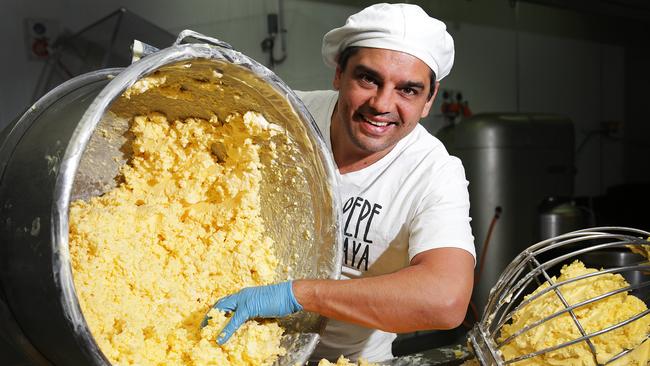
“Farmers’ markets were a way for us to get seen and have people try our product.”
While there was a lot of hard work, experimentation, marketing, phone calls and door knocking, Pepe said they were in the right place at the right time to take advantage of the increased call from consumers to buy Australian.
Pepe Saya butter is now exported to at least 12 countries, is in some of the top restaurants in Australia and is served in Qantas first-class.
The branding is one thing that sets Pepe Saya butter apart. It is served in a unique round pat with the iconic Pepe Saya head.
While he lives and breathes butter, Pepe is far from the “food snob” head on the branding.
“It is very personal and symbolic, but everyone has an alter ego around food and this is mine.”
SCOTT DE BRUIN, MAYURA WAGYU
Scott de Bruin is a trailblazer in the Australian Wagyu industry.
And his impressive contributions, both to his own Mayura Station business and the wider Wagyu industry, has meant he was recently awarded an honorary life membership to the Australian Wagyu Association.
A shipment of 25 Wagyu females from Japan, via the US, in January 1998 formed the foundation of the Mayura Wagyu herd and set Scott on the path to producing some of the best tasting steak in the world.
Scott is the managing director of the multimillion-dollar Mayura Station, based at Millicent in South Australia. Mayura now comprises 12,000 full-blood Wagyu cattle turning off 75 tonnes of highly marbled premium retail beef a month to international and domestic customers.
The business also boasts an on-farm restaurant, The Tasting Room, which opened in 2010 to showcase Mayura’s produce, while if you were to buy a Mayura Station Wagyu marble score of 9-plus steak from a high-end butcher, it will set you back between $225/kg to $250/kg.
Scott’s tenacity, knowledge and passion for Wagyu has set the business up for success, with a strong foothold in overseas markets, including China, South East Asia, Dubai and now the United States.
He previously told The Weekly Times “we were one of the first people to start producing and marketing full-blood Wagyu beef – that was a great opportunity for us but I think if you were starting now it would be much more difficult”.
Scott notes that a particular bull, Mayura Itoshigenami Junior, was the “game changer” for Mayura.
“He is the most proven Wagyu sire outside of Japan,” he said.
Described by Scott as the “backbone” of their branded beef, Scott was so certain of Junior’s value he knocked back lucrative propositions to sell him.
“I was offered half a million dollars to sell him, and I turned it down.”
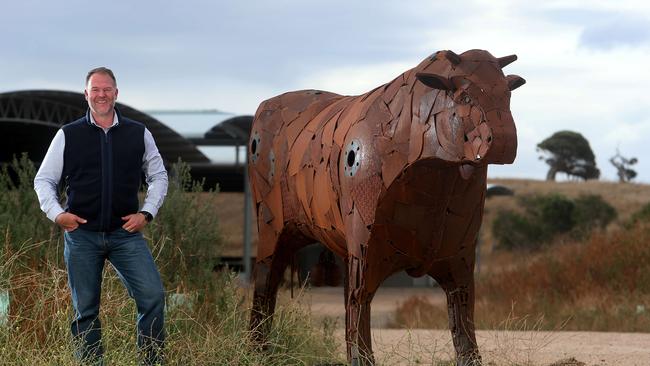
JULIE AND SANDY CAMERON, MEREDITH DAIRY
The jar of Meredith Dairy marinated goat’s cheese is iconic in Australia.
And for good reason.
Meredith Dairy was established in 1991 by Julie and Sandy Cameron after the turmoil of the wool price crash and uncertain commodity prices.
“To survive on the land we needed to be innovative and add value to our farm produce.”
And that’s where milking sheep and goats to make cheese and yoghurts came in.
Now the brand is sold Australia-wide as well as exported to countries like the US, China, Japan and Malaysia.
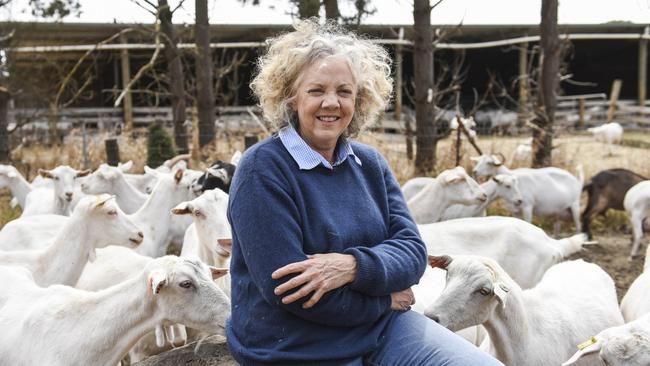
A big part of the Meredith Dairy story is their responsible, sustainable farming methods.
The sheep and goats are healthy, well-fed and well-nurtured, which makes for “incredible milk”.
Meredith Dairy has been awarded a Sydney Royal President’s Medal, a gold award in the International Cheese and Dairy Awards and a champion in the Australian Grand Dairy Awards.
CHESWORTH FAMILY, LITTLE BIG DAIRY CO
Consumers in the know will happily pay a premium for The Little Big Dairy Co cream.
And what sets it, and other The Little Big Dairy Co products, apart is the quality, taste and the fact it is from a single source.
Steve and Erika Chesworth and family started The Little Big Diary Co in 2013 to deliver “the best tasting, single source milk” to as many people as possible and to make the business sustainable for the next generation.
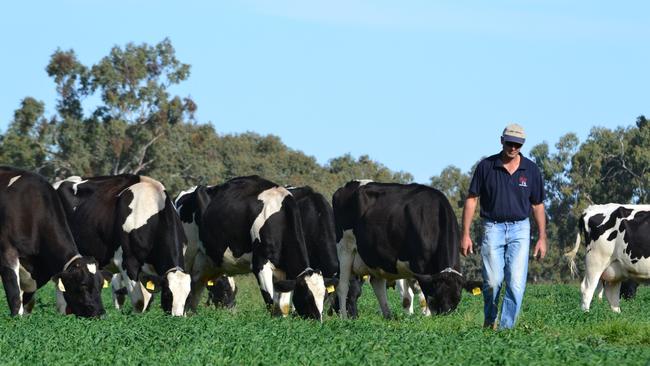
The dairy brand is run alongside their dairy farming enterprise, Tomargo Recluse Holsteins, on the Macquarie River west of Dubbo in central western NSW with two generations of the Chesworth family working in the business.
About 100,000 litres of milk a week is sold to cafes, as well as being stocked in retail outlets including David Jones, local Woolworths and Coles stores and independent IGA and Harris Farm supermarkets.
The Little Big Dairy range includes full-cream, less-cream, no-cream and non-homogenised milk, double and pouring cream and coffee, chocolate and honey malt and vanilla flavoured milk, as well as salted butter.
In 2020 the aforementioned cream was awarded champion at The Australian Grand Dairy Awards.
Previously Erika told The Weekly Times what sets them apart was “we don’t compromise on farm”.
TOM AND PHOEBE BULL, KINROSS STATION LAMB
Kinross Station Lamb might be best known for its lamb cutlets hitting $120/kg.
And it certainly hasn’t been a fluke, with Tom and Phoebe Bull on a mission to develop Australia’s best tasting lamb chop.
The pair operate the Lambpro sheep studs from Kinross Station, near Holbrook in southern NSW, where they run about 6000 ewes, as well the Kinross Station Hampshire Downs.
With the goal to produce “the Wagyu of the lamb world” to take lamb from being just a commodity to a premium product, the Bulls set about determining the sheep breed which produced the best tasting lamb.
They identified the Hampshire Down performed well for marbling and growth and purchased five of the only Hampshire Down flocks in Australia that had a background in flock performance recording.
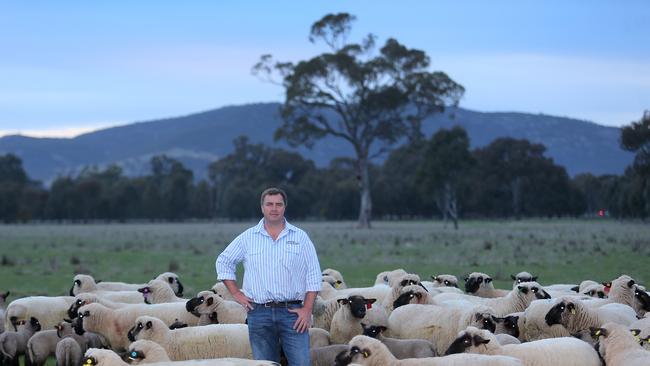
Now one of the most influential seedstock enterprises in the prime lamb industry and with the Kinross Station marbled lamb chops on the menu at some of the world’s best restaurants, Tom puts their success down to tossing out tradition and focusing on profitability.
“I couldn’t understand why there wasn’t specialist lamb breeds like in the beef industry, bred for quality lamb, not wool,” Tom previously told The Weekly Times.
The The Weekly Times Coles 2018 Farmer of the Year, Kinross Station branded lamb is sold in the US, China, Hong Kong, Taiwan, Malaysia, the Maldives, Singapore and Dubai.
More Coverage
Originally published as Meet the producers behind Australia’s $250/kg Wagyu steak and $120/kg lamb




